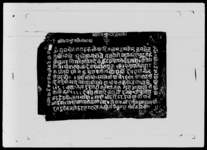A copperplate inscription recording the offering of two slave girls by Bālakṛṣṇa Upādhyā to serve at Paśupatinātha (ŚS 1695)
ID: PN_0002_0002
Edited and
translated by Manik Bajracharya
in collaboration with
Rabi Acharya
Created: 2016-10-07;
Last modified: 2023-03-15
For the metadata of the document, click here
The accompanying edition, translation/synopsis and/or commentary are available under the terms of the Creative Commons Attribution-ShareAlike 4.0 International License
Abstract
This copperplate inscription memorializes Bālakṛṣṇa Upādhyā’s dedication of two Newar slave girls named Naku and Guṇavatī to the service of Lord Paśupatinātha. The document specifically mentions that the Bhaṭṭa temple priests shall have no authority over the girls.Diplomatic edition
[1r]
श्री५पशुपतिर्जयति॥[a figure of the Sun][a figure of the Moon]श्री५पशुपतिनाथका[a figure of a triśūla]साक्षीश्रीवीरभद्रराणा॥ शुभंसाक्षीपुत्रश्रीषडाननउपाध्या॥1ॐअद्यश्वेतवाराहकल्पेत्यादि॥आषाढमासेशुक्लपक्षेच2तुर्थ्यांतिथौअश्लेषानक्षत्रेवज्रयोगेयथाकरणमुहूर्त्तके
3मिथुनराशिगतेसवितरिकर्क्कटराशिगतेचंद्रमसि॥आत्रेय
4गोत्रेःश्रीबालकृष्णदेवशर्म्मासपुत्रःश्री३पशुपतिभट्टार
5कप्रीतयेइमेनकुगुणवतीनाम्न्यौदास्यौदेवदासीत्वेन
6संप्रदत्तौ॥ ॥अथभाषा॥स्वस्तिश्रीशाके१६९५आषाढशु
7द्दिचतुर्थीकादिनमाहाभीरकोट्याश्रीबालकृष्णउपाध्याले
8- - - -चरणतलदुइगोटीकमारीनकुगुणभन्याकीने
9वार्नीकन- - - -देवदासीगरिचढायौंइनमाथीपुजारा
10भट्टहेरुकोलागनास्ति॥साक्षीश्रीहरिहरउपाध्याकोपाचे
11भाईका॥साक्षीभगवतीवनगोसाइ॥लेखकश्रीदुर्गानाथमहाचार्य्या॥
12इनदुऐकनजोहरणगरलातस्कनपंचमहापातंकहोला॥ ॥
Translation
[1r]
May the five-fold venerable Paśupati be victorious!
[a figure of the Sun]1
[a figure of the Moon]2
the fivefold venerable Paśupati's3
[a figure of triśūla]4
Witness: the venerable Vīrabhadra Rāṇā; auspiciousness5
Witness: the venerable Ṣaḍānana Upādhyā, the son [of Bālakṛṣṇa Upādhyā]6
Oṃ. Today, [in] the aeon called Śvetavārāha, and so on; on the 4th of the bright fortnight of the month of Āṣāḍha, in the Aśleṣa lunar mansion, in the Vajra yoga, in an appropriate karaṇa and muhūrta, when the Sun and the Moon were in the zodiacal signs Mithuna and Karkaṭa respectively, within the Ātreya lineage, the venerable Bālakṛṣṇa Deva Śarmā together with his son has offered two slaves, named Naku and Guṇavatī, as devadāsīs7 for the pleasure of the threefold venerable Paśupati Bhaṭṭāraka.
Now, [in the] vernacular language. Hail! On the 4th of the bright fortnight of Āṣāḍha in the Śaka year 1695, [I], the venerable Bālakṛṣṇa Upādhyā of Bhīrakoṭa, have offered the two Newar slaves named Naku and Guṇa to the feet of --- [i.e., the fivefold venerable Paśupatinātha]8 as devadāsīs of --- [i.e., the fivefold venerable Paśupatinātha]. The Bhaṭṭa caretakers [of the temple] [shall] have no authority over them. Witnessed by the five brothers of the venerable Harihara Upādhyā. Witnessed by Bhagavatī Bana Gosāi. Writer [of the inscription]: the venerable Durgānātha Mahācārya. Whoever takes these two [slaves] away will be guilty of the five great sins (pañcamahāpātaka).
Commentary
This copperplate from Paśupatinātha temple, dating to 1773 (ŚS 1695), concerns a donation of two Newar female slaves to the temple by a Bhīrakoṭa Brahmin named Bālakṛṣṇa Deva Śarmā (also named as Bālakṛṣṇa Upādhyā in the document). The document does not mention the name of the king, Pṛthvīnārāyaṇa Śāha, reigning over the Kathmandu Valley at the time. Bhīrakoṭa, the the donor’s place of residence, was a part of the Caubīsī kingdoms to the west of Gorkha. A previous edition of this document appears in Śreṣṭha 1974: 104-105. Also, for a short analysis of the document, see Pant 1997: 138.

